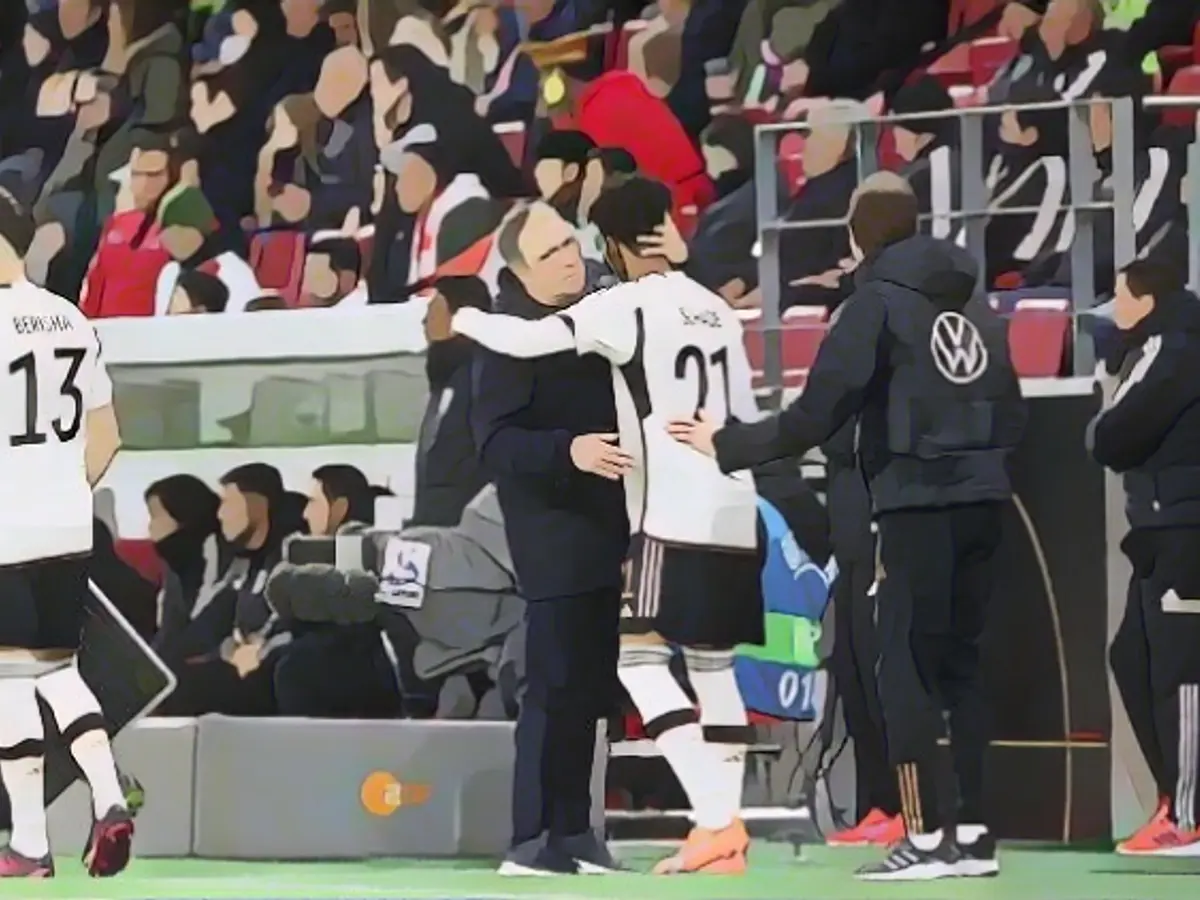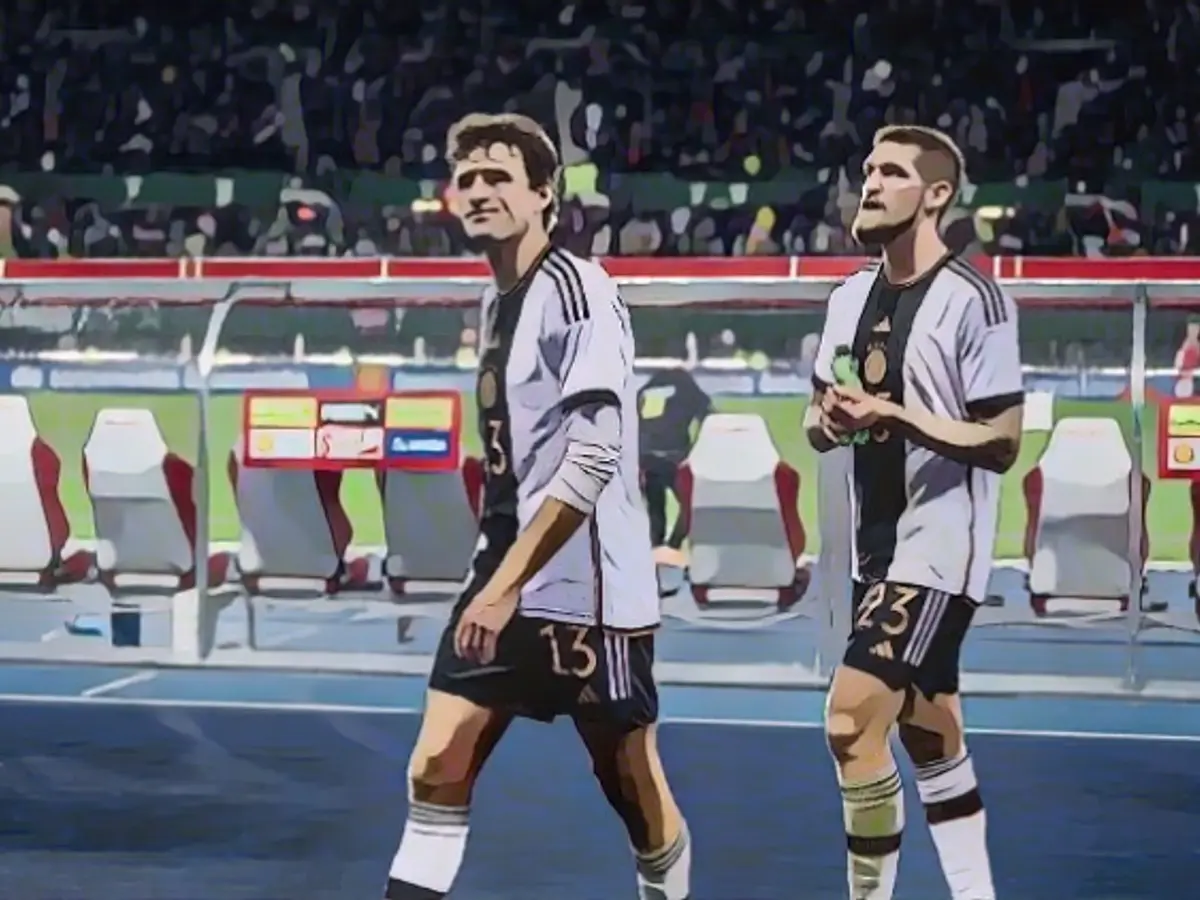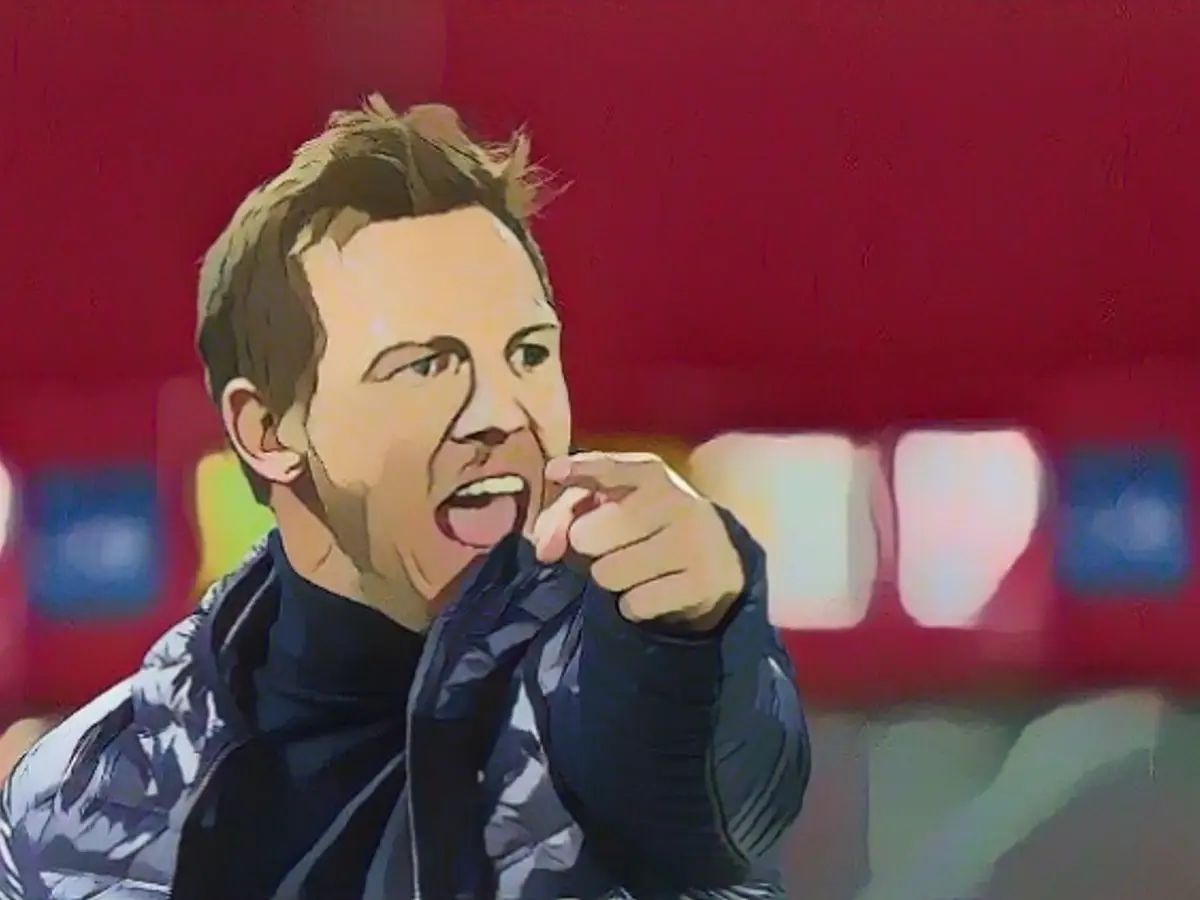Nagelsmann already has everything flying around his ears
Germany's footballers dragged themselves out of this disastrous international year with an appallingly weak performance. The attempt to lighten the mood backfired badly against Austria in Vienna. The national coach is already desperate.
Julian Nagelsmann was already feeling the pressure before the game in Vienna. The German national soccer team had to get a good result against Austria. And also a good performance. The national coach called what he felt inside him "art-and-wise pressure". Germany's footballers wanted to send Germany's soccer fans into the year-end spurt with the good feeling that everything can be good next year. That the home European Championship, which is supposed to heal Europe's democracies (that's the wish of tournament director Philipp Lahm) and simply be fun, will be a summer fairytale after all.
Small spoiler: Mission crashed and burned. Germany have embarrassed themselves. Not that you can't lose to Austria. But not like this. The DFB squad and their coach dragged themselves out of the year with wild discussions: Can't this team do better? The coach gave an initial answer: "The team is not liberated. We're not the unit we are off the pitch. We're not brimming with confidence, that's just a fact."
The performance in Vienna, in the Ernst Happen Stadium, serves as a basis for the debates to come. They will not flatter the national team. The German players' performance against Ralf Rangnick's side was too disastrous. The duel was lost 0:2 (0:1) after goals from Marcel Sabitzer (29) and Christoph Baumgartner (73). That was not only well deserved, but also the best news of the evening. The hosts, who have high hopes for the tournament with their strong generation, were too superior. Austria had the right passion and plan. Professor Rangnick didn't even have to be particularly sophisticated to dismantle Germany. With high chipped balls, they got behind the final chain in no time at all. Mats Hummels and Antonio Rüdiger looked overwhelmed time and time again. There was no pressure when playing against the ball and no solutions when playing with the ball. Phew.
"But when we have absurd ball losses ..."
Germany's footballers are once again struggling with weakening defenses in the autumn cold season. A problem that cannot be solved? "The team's great strength is game control and attacking soccer," said the coach. "But when we lose the ball absurdly, as we did in the first half, we have a lot of defending to do - and that's where we simply have problems. Our play is too slow, too undynamic." Alarm! "I want to get out of the victim role, that's no good," confessed the badly hit Nagelsmann once again. ALARM! "We have worried fans and a critical media landscape. But it's about the players accepting that they won't get out of this with a bit of kicking. That we have to work even harder. That we have to get away from the idea that they're all great footballers, but that we have to come through emotion and mentality."

While it was possible to extract 20 good opening minutes from the defeat against Turkey last Saturday in Berlin, there was nothing of value this time. Or to put a positive spin on it, pessimism does not go down well with the national coach: The game in Vienna provides 90 minutes of insight into how not to do it again in the future. And there is now enough time to come to terms with things. They won't play together again until March. This also means that nothing will change in the team's condition until March. That must be a horror scenario for an ambitious coach like Nagelsmann. And it will be accompanied by rounds of experts who will hardly have a good word to say about the DFB team. And that is still the "best case scenario", as they say in manager-speak. Because it means that the team still triggers emotions.
It could also turn out differently. The national team may disappear from the minds of German soccer fans very quickly. That would be much more dramatic. Because in the desperate struggle to bring the team back to the man and woman, the emotional turning away would be the nail in the coffin. All credit seems to have been lost. And they wanted to get it back through top performances. But these remain in short supply. There have been eleven games this year. It all began with the heavy backpack of the World Cup disaster in Qatar against Peru almost exactly a year ago. There was a 2:0 victory. The match remained unique in its result, it was the only one without conceding a goal. Hansi Flick was still the national coach at the time. Only two more victories followed. An atmospherically redeeming one under interim national coach Rudi Völler (2:1 against France). And one under Nagelsmann, directly in the first game, against the USA (3:1).
Like the Turks and the Austrians
Rudi Völler, now DFB sporting director again, is aware of the fragility of the situation and makes clear announcements to the players. It is an eternally repeated mantra, but will it ever get into the players' heads? "We will only succeed in playing a good European Championship and getting people back on our side if we do what the Turks and Austrians did: To make more of the five percent that we make less of in the clubs here," emphasized the liaison man to the people. Only if "everyone goes the extra mile" will the team be able to compete at a high level. "We have to bring that five to ten percent of passion, energy and dynamism to the game, otherwise it will be difficult."
But otherwise there was little to nothing. Little courage, a lot of desperation. No stability, hardly any emotion. Except for Leroy Sané, who has been in good form for months. However, they ended up in the wrong channel. After the break, he was so charged up that he got carried away with an angry assault. Red and probably a few games ban. A relapse could not be more bitter for a patient who is urgently struggling to heal.

Nagelsmann has already come to terms with the fact that his start at the DFB is even weaker than that of Erich Ribbeck, who is still synonymous with the very dark times in sport. This chapter may soon have to be rewritten. Because now, as then, players are suddenly appearing in the national team who some people have never heard of. Robert Andrich, for example, made his debut in Vienna and is already the 40th player to play for the team this year. After all, he did a really good job and has recommended himself for further tests as a defensive six.
Experimentation has been a big issue this year. Too big for Flick, who was sent off in September. With a view to the home European Championship, everything should be geared towards hierarchy, stability and routines. But not a trace of that. Nagelsmann also tried and tried. He left Joshua Kimmich out against Austria, for only the second time in their 73 games together at FC Bayern. He wanted more variability with a view to the tournament, he said. Small spoiler: Project failed. Captain İlkay Gündoğan is making an honest effort, but he still lacks a dominant influence on the team. And Leon Goretzka, who was now supposed to make things right, did well, but his attacking strengths were completely lost in the venomous fight against the ball. Pascal Groß, who had impressed as the "holding six" on the USA tour, only had a place on the cold bench against both Turkey and Austria.
"We have decided on a path"
"You don't slap an idea onto a team, you look at what players you have," said Nagelsmann, defending himself against criticism of his plan. "And then you look at what solutions make it better all around. We decided on one way - also in consultation with the team - and played the same in all games, only with two or three changes in the starting eleven."
Just how much Nagelsmann is struggling to find the right plan can be seen in Kai Havertz. Against Turkey, he was called up as a left-back. Only to have it explained later that he had been given a rail-10 with joker duties (or something). Well. Against Austria, the coach repeated his experiment, which he expressly did not want to be understood as such. As the game progressed, there were always new instructions for the Arsenal FC player. And always new roles. Critics will draw arguments from this to support their accusation that the coach is overtaxing his team with his ideas. Julian Nagelsmann feels the pressure, even more so after this game. Question at the media round table: "Have you regretted taking on the job?" Nagelsmann: "No, I haven't regretted it, I'm enjoying it."
In light of Germany's underwhelming performance against Austria, calls for improvement in the team's defense and overall performance have been growing. DFB coach Julian Nagelsmann has acknowledged these concerns, stating, "We're not the unit we are off the pitch. We're not brimming with confidence, that's just a fact." Previously, Nagelsmann had hoped that the German national soccer team could regain lost credibility with strong performances, as Ralf Rangnick's Austria demonstrated how to dismantle the German defense with ease.
Source: www.ntv.de








